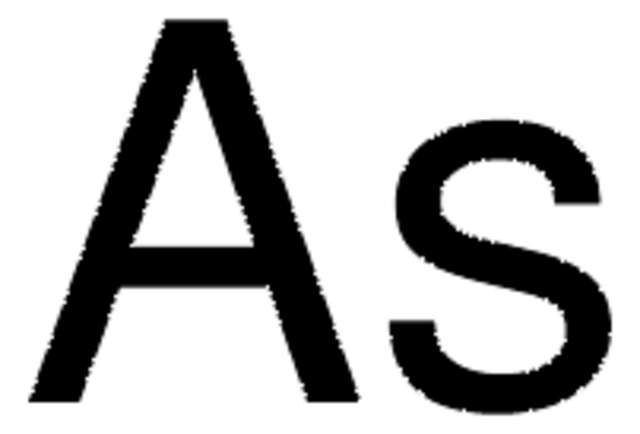Wszystkie zdjęcia(2)
Kluczowe dokumenty
GF27009514
Iron
rod, 150mm, diameter 5.0mm, as drawn, 99.99+%
Synonim(y):
Iron, FE007943
Zaloguj sięWyświetlanie cen organizacyjnych i kontraktowych
About This Item
Wzór liniowy:
Fe
Numer CAS:
Masa cząsteczkowa:
55.85
Numer MDL:
Kod UNSPSC:
12141721
Identyfikator substancji w PubChem:
NACRES:
NA.23
Polecane produkty
Próba
99.99%
Formularz
rod
producent / nazwa handlowa
Goodfellow 270-095-14
rezystywność
9.71 μΩ-cm
dł. × śr.
150 mm × 5.0 mm
bp
2750 °C (lit.)
mp
1535 °C (lit.)
gęstość
7.86 g/mL at 25 °C (lit.)
ciąg SMILES
[Fe]
InChI
1S/Fe
Klucz InChI
XEEYBQQBJWHFJM-UHFFFAOYSA-N
Opis ogólny
For updated SDS information please visit www.goodfellow.com.
Informacje prawne
Product of Goodfellow
Ta strona może zawierać tekst przetłumaczony maszynowo.
Wybierz jedną z najnowszych wersji:
Certyfikaty analizy (CoA)
Lot/Batch Number
Przepraszamy, ale COA dla tego produktu nie jest aktualnie dostępny online.
Proszę o kontakt, jeśli potrzebna jest pomoc Obsługa Klienta
Masz już ten produkt?
Dokumenty związane z niedawno zakupionymi produktami zostały zamieszczone w Bibliotece dokumentów.
Thomas A Russo et al.
Infection and immunity, 82(6), 2356-2367 (2014-03-26)
Hypervirulent (hypermucoviscous) Klebsiella pneumoniae (hvKP) strains are an emerging variant of "classical" K. pneumoniae (cKP) that cause organ and life-threatening infection in healthy individuals. An understanding of hvKP-specific virulence mechanisms that enabled evolution from cKP is limited. Observations by our
Laura M van Staalduinen et al.
Proceedings of the National Academy of Sciences of the United States of America, 111(14), 5171-5176 (2014-04-08)
The enzymes PhnY and PhnZ comprise an oxidative catabolic pathway that enables marine bacteria to use 2-aminoethylphosphonic acid as a source of inorganic phosphate. PhnZ is notable for catalyzing the oxidative cleavage of a carbon-phosphorus bond using Fe(II) and dioxygen
Eunna Choi et al.
Infection and immunity, 82(6), 2203-2210 (2014-03-20)
In order to survive inside macrophages, Salmonella produces a series of proteins encoded by genes within Salmonella pathogenicity island 2 (SPI-2). In the present study, we report that Fur, a central regulator of iron utilization, negatively controls the expression of
Hypoferremia of infection: a double-edged sword?
Kristen L Lokken et al.
Nature medicine, 20(4), 335-337 (2014-04-09)
Don-Kyu Kim et al.
Nature medicine, 20(4), 419-424 (2014-03-25)
In response to microbial infection, expression of the defensin-like peptide hepcidin (encoded by Hamp) is induced in hepatocytes to decrease iron release from macrophages. To elucidate the mechanism by which Salmonella enterica var. Typhimurium (S. typhimurium), an intramacrophage bacterium, alters
Nasz zespół naukowców ma doświadczenie we wszystkich obszarach badań, w tym w naukach przyrodniczych, materiałoznawstwie, syntezie chemicznej, chromatografii, analityce i wielu innych dziedzinach.
Skontaktuj się z zespołem ds. pomocy technicznej


